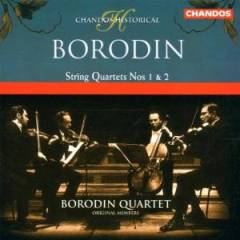Borodin Quartet – Borodin: String Quartets 1 & 2 (2001)
Borodin Quartet – Borodin: String Quartets 1 & 2 (2001)

1. String Quartet No. 1 In A Major: I Moderato - Allegro 2. String Quartet No. 1 In A Minor: II Andante Con Moto - Fugato. Un Poco Piu Mosso 3. String Quartet No. 1 In A Minor: III Scherzo. Prestissimo 4. String Quartet No. 1 In A Minor: IV Andante - Allegro Risoluto 5. String Quartet No. 2 In D Major: I Allegro Moderato 6. String Quartet No. 2 In D Major: II Scherzo. Allegro 7. String Quartet No. 2 In D Major: III Notturno. Andante 8. String Quartet No. 2 In D Major: IV Finale. Andante – Vivace Rostislav Dubinsky – violin Yaroslav Alexandrov – violin Dmitry Shebalin – viola Valentin Berlinsky – cello
Alexander Borodin was one of those remarkable people who can pursue several equally successful careers. He studied various instruments as a boy, began to compose in his teens, and became famous in music, chemistry, and medicine. His two quartets are thoroughly romantic. The first, heard less frequently, is never less than pleasant and often felicitous, with many lovely melodies; a mournful, very Russian slow movement; and a scintillating, feathery Scherzo, whose Trio, primarily in harmonics, has a celestial sound.
The second quartet is greatly superior and more concise, the thematic material more inspired and better developed. It is famous for its slow movement, "Notturno," a tender, rapturous dialogue between cello and first violin, which has been described as a love scene between Borodin and his wife of 20 years, to whom the work is dedicated. Toward the end, however, it suddenly becomes melancholy, as if in foreboding: Borodin died six years later, only 55 years old.
The playing here is breathtakingly beautiful. The date of the original recording is not mentioned, though on the picture the players look very young. The Quartet was formed by its leader, Rostislav Dubinsky, and cellist Valentin Berlinsky in 1945; the other two members joined in the early '50s. These are the musicians heard on this disc; they played together until 1975, when Dubinsky emigrated to America. The four players are absolutely equal. Their technical command is complete, their ensemble seamlessly integrated, their tone flawlessly pure, smooth as silk, and warm as velvet; the first violin soars radiantly. They bring out every mood and nuance with deep, inward expressiveness, but with a noble restraint that precludes sentimentality; they hardly slide and never exaggerate. The Quartet still exists, but Berlinsky is the only original member left. ---Edith Eisler, amazon.com
The Borodin Quartet's Melodiya recording of Borodin's own two quartets was the winner of a Gramophone Award in 1983, earning more votes than any operatic or choral issue. Lionel Salter, in his original review of the LP, declared that he did not expect to hear the two works ''more persuasively played'', and in September 1986, SJ described the recording as ''a strong contender for CD transfer''. I can only add my praise for these magnificent performances to that of my colleagues, the Russian ensemble (with a different first and second violin from the team that recorded Borodin's Second Quartet for Decca over 20 years ago now deleted—but with the same viola and cello) have the music in their blood and match the need for flexibility of phrasing and rhythm with a unanimity of articulation and intonation that is quite staggering. --- Robin Golding, Gramophone
download (mp3 @320 kbs):
yandex 4shared mega mediafire cloudmailru uplea ge.tt








